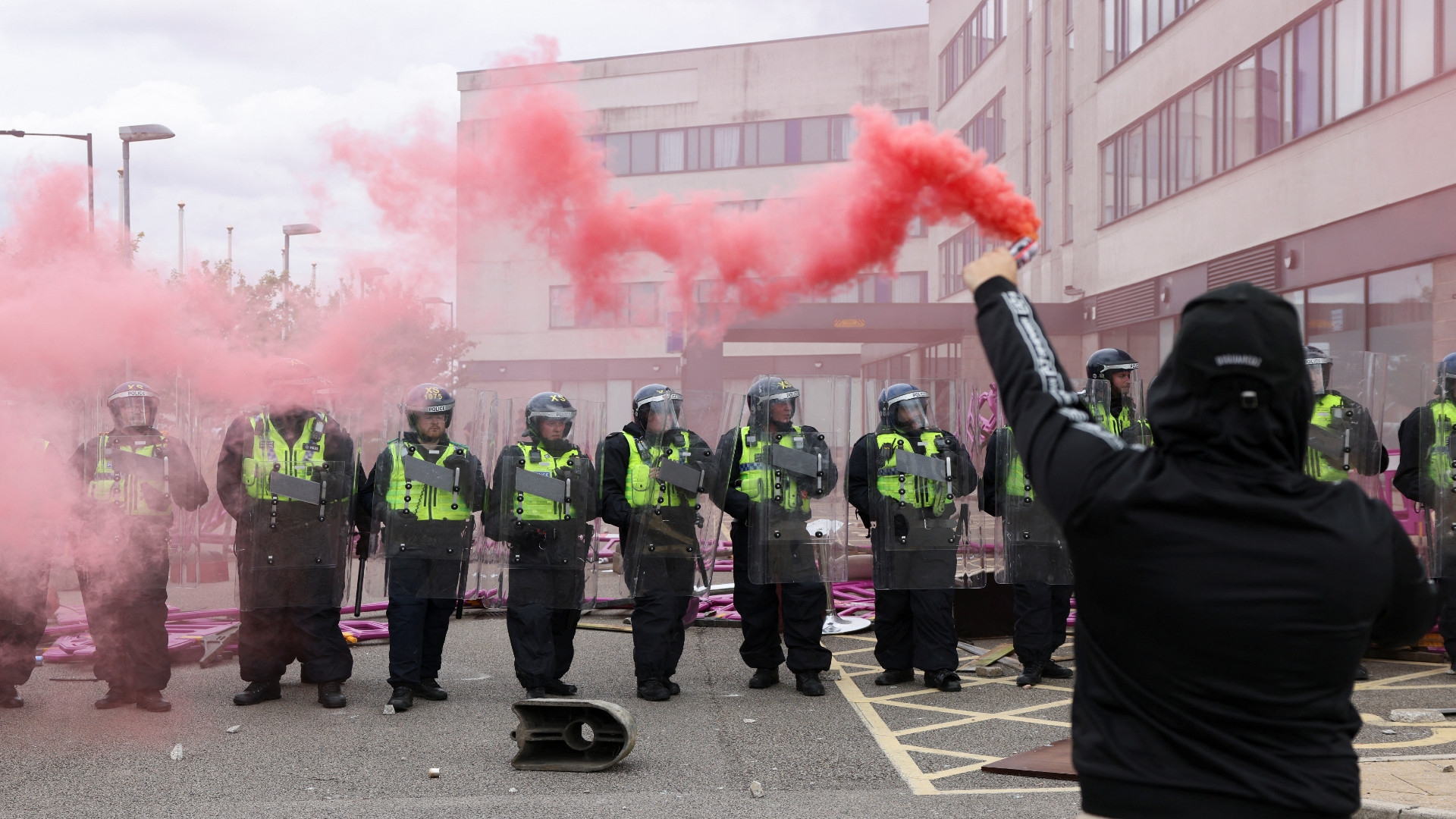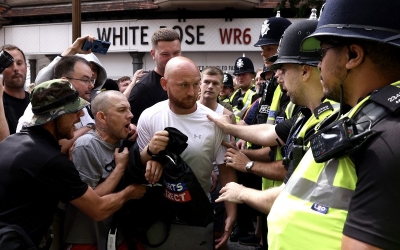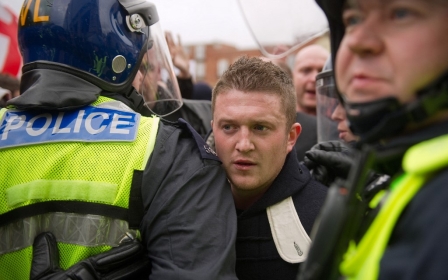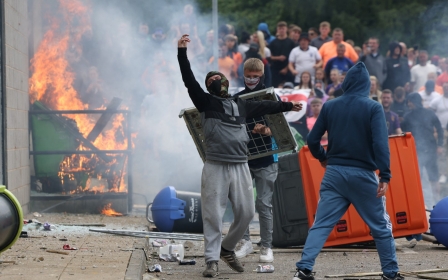UK riots: Labour's anti-migrant rhetoric fuelled 'toxic atmosphere’ in attacks, campaigners say

Alia** is afraid to leave her asylum accommodation. Even when she goes to the shops, she senses palpable hostility from the local community.
Footage of anti-immigration and anti-Muslim rioters besieging and attempting to torch hotels housing asylum seekers in towns and cities across the UK last week has confirmed her worst fears.
On Sunday, she watched from her window as a mob of people, some draped in Saint George's Cross flags, besieged the local mosque. She wonders if she will be next.
“I’m so scared that this is going to happen to me,” she told Middle East Eye.
The wave of violence targeting mosques and asylum seeker hotels last week was triggered by an attack on the Southport Islamic Society Mosque on Tuesday, following the deadly stabbing of three girls at a Taylor Swift-themed dance class.
New MEE newsletter: Jerusalem Dispatch
Sign up to get the latest insights and analysis on Israel-Palestine, alongside Turkey Unpacked and other MEE newsletters
While far-right influencers and politicians have openly stoked the mobilisations by spreading misinformation about the attacker's identity, commentators and campaigners have highlighted the role of mainstream politicians’ anti-migrant rhetoric in fuelling the unrest and exposing people like Alia to violence.
A former professional volleyball player, Alia fled Iraq in May 2022 when her father and brother threatened to kill her after she was raped.
In the UK, she faced hostility from the Home Office, which detained her for deportation to Rwanda in April 2023, as well as her local community. She was even barred from joining a local volleyball team due to her immigration status.
“I cry every night. I wake up because I have nightmares about my dad and my brother,” Alia said.
She has made multiple suicide attempts.
“The Home Office didn’t protect me. They didn’t understand my situation. I came here to be safe, not to be belittled or threatened… it’s not much to ask,” she said.
“I think English people hate me.”
A false story
According to the far-right monitoring group Red Flare, the riots have seen an emergence of a “terroristic strain of the far-right”, which previously existed in the dark corners of social media platforms but has been emboldened by the mainstreaming of anti-migrant rhetoric and policies.
“Outlets like the Daily Mail say this is all Russian disinformation or that Tommy Robinson’s behind this,” a Red Flare spokesperson told MEE.
“He is a key node and shares some responsibility, but people are less willing to talk about the toxic, racist atmosphere that's been mainstreamed in the last few years. And without that, I think it would be much more difficult to imagine this taking place.”
Throughout its 14-year rule, the former Conservative government demonised people on the move, beginning with the introduction of the Home Office's hostile environment policies in 2013, a series of measures designed to make the UK inhospitable to asylum seekers.
Former Prime Minister Rishi Sunak’s failed flagship policy, the Rwanda scheme, a plan to send asylum seekers to Kigali, saw hundreds rounded up in vans and detained for deportation, only to be released when the plan was shelved ahead of the general election in July.
The direct influence of Conservative rhetoric and policy on the recent wave of rioting is starkly evident in the rioters’ adoption of Sunak’s slogan “stop the boats”.
Campaigners have also pointed to Labour’s role in contributing to the dehumanisation of migrants and pandering to the far-right.
“Controlling the UK’s borders” was central to the party’s election campaign, with now-Prime Minister Keir Starmer promising to slash “sky-high” net migration figures and to “smash the gangs”, echoing the Conservative “stop the boat” slogan.
The party’s manifesto pledged to "control" immigration and "remove" people "who have no right to be here".
In the days before the general election, Starmer drew fire for questioning why Britain was unable to deport Bangladeshi asylum seekers during a debate on the Sun newspaper’s recent election show.
On his first day in office, Starmer pronounced the Rwanda scheme “dead and buried”, a move framed as a financial decision rather than a moral one, branding it an “expensive gimmick”.
The policy was quickly replaced by legislation to fast-track deportations and boost workplace raids.
“We have seen Labour promise, arbitrarily, to bring down immigration regardless of the needs of the country or of the people on the move,” migration and asylum policy specialist Zoe Gardner told MEE.
“This validates the false story that immigration is a problem instead of a natural and positive thing. By accepting that framework for discussion, Labour has ceded ground to racist and extreme voices on immigration.”
A minority of criminals
In the wake of the attacks, Labour politicians studiously avoided explicitly naming the Islamophobic and anti-migrant impetus propelling the riots.
In a speech following the attack, Starmer doggedly avoided referencing the rioters’ racism, instead characterising them as "thugs” and pledging to set up a new policing unit to tackle the unrest.
Home Secretary Yvette Cooper also blamed the violence on a “thuggish minority of criminals”.
Jeremy Corbyn and four independent MPs wrote to Cooper, criticising Starmer for not going “nearly far enough in identifying the anti-immigrant and anti-Muslim hatred” driving the riots.
Labour MP Zarah Sultana denounced this failure in an interview with Good Morning Britain, during which presenter Kate Garraway asked her: “Why does it matter to you to use the word Islamophobic?”
“Why is there such controversy around calling it Islamophobic when we know Muslim communities are being targeted?" she demanded.
“Do you believe it’s important to control and manage immigration?” co-presenter Ed Balls responded.
Meanwhile, commentators have pointed to repeated references by Labour ministers to the expense of housing asylum seekers in hotel accommodations.
Some accused Labour MP Sarah Edwards of incitement after she named one of the hotels targeted in last week’s attacks in parliament, saying that Tamworth residents “wanted their hotel back” in the weeks leading up to the riots.
In a statement responding to the attack and arson attempt on a hotel housing asylum seekers in Aldershot, newly elected MP Alex Baker failed to mention that the attack targeted asylum seekers. Instead, she insisted she had been “working on the issues we have inherited on asylum accommodation”.
Middle East Eye delivers independent and unrivalled coverage and analysis of the Middle East, North Africa and beyond. To learn more about republishing this content and the associated fees, please fill out this form. More about MEE can be found here.






